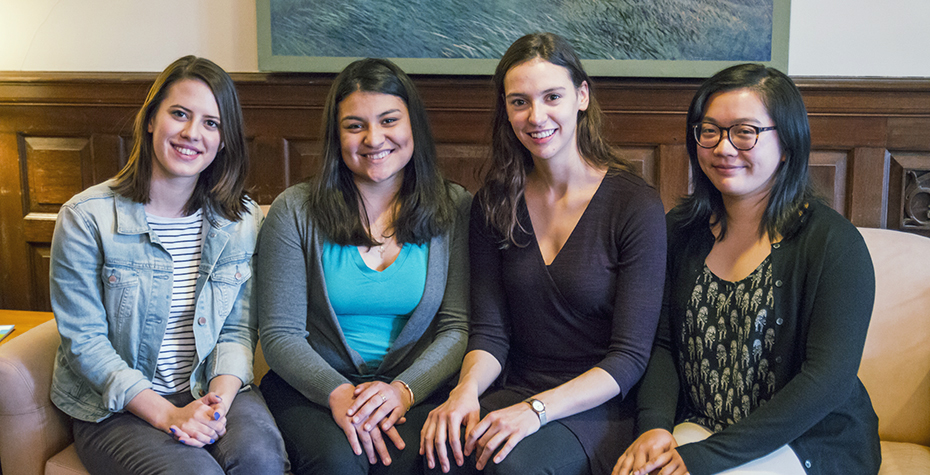Wellesley's Daniels Fellowship Allows Students to Pursue Dream Projects

Nora Mishanec ’14, Rosa Guzman ’14, Echo Yue ’14, and Ava Bramson ’14 each have the opportunity to pursue a “dream project” this year, thanks to the Pamela Daniels Fellowship.
The Daniels Fellowship was established in 2000 in honor of alumna, author, and former class dean Pamela Daniels ’59. A merit award designed to encourage the maverick spirit at Wellesley, the fellowship is meant to provide an opportunity for a senior (or seniors) to envision and carry out a piece of work that she would love to do before she graduates—a work of imagination as well as intellect, a “worthy and vivid dream project” that explores who she is as well as what she knows.
This Year's Fellows and Their Dream Projects
Nora Mishanec ’14
Oral Histories of Wellesley Alumnae of African Descent, 1950-1960
“My project was inspired by an assignment in Professor Brenna Greer's history course titled Modern Black Freedom Struggle,” said Nora Mishanec ’14, who majors in psychology. “The assignment was to collect one oral history, but with Professor Greer's encouragement I ended up doing several because I got so wrapped up in it Fast-forward to today and I'm working on creating a whole collection of oral histories in the Archives from Wellesley alumnae of African descent who graduated in the pre-Ethos era of the 1950s.” The fellowship will enable Mishanec to travel to collect these oral histories, histories she hopes will be useful for future research.
Rosa Guzman ’14
Effects of E-Readers on Children's Recall of Mental State and Factual Information: From a Socioeconomic Point of View
“My project was inspired by my passion in language and literacy development,” said Rosa Guzman ’14, who is interested in how socioeconomic status affects language and literacy democracy. She explained, “Children from families of lower socioeconomic status are found to be exposed to little linguistic input from birth and few instances of shared book reading time. Children from low socioeconomic environments have fewer access to books, and their parents do not always read to them, because of work obligations or language barriers. Shared book reading is vital for children to not only become familiar with books, words, and letters, but it also helps them in their ability to understand that people have different beliefs, intentions, and desires, among other mental states that differ from their own.” The psychology major plans to study the effects of electronic readers or e-readers on children’s narrative comprehension, through testing pre-schoolers in Framingham. She is excited for the opportunity the fellowship provides to “to network with preschools all around the Boston area and help explore a possible intervention to help children have access to reading.”
Zhengyang “Echo” Yue ’14
Engagement in Nature: A Visual Exploration of Wellesley Botanical Gardens
For Zhengyang “Echo” Yue ’14, it was the fusion of her love of the Wellesley landscape combined with her art education and her experience at the Botanical Gardens that inspired her Daniels project. “As an international student, I found the sense of home in Wellesley's timeless nature by learning the trees, familiarizing the space, and getting to know the landscape,” said Yue, who majors in architecture and minors in mathematics. “I want to relate myself even more to the nature and leave my own marks on this campus. Through my project, I hope to give back to the community through the art and architecture education I gained in the past years and allow others to partake in nature and love nature as I do.” Using the fellowship funds, she will create artworks using natural materials, and then place them in strategic locations throughout the campus.
Ava Bramson ’14
The To the Lighthouse Reader: Virginia Woolf and the Problem of Knowing Another
English major Ava Bramson ’14 found her inspiration exploring the work of Virginia Woolf in a class with Barbara Morris Caspersen Associate Professor in the Humanities and Associate Professor of English Lisa Rodensky. In Rodensky’s course, Bramson became excited by the possibilities of using Woolf’s lesser-known essays and diary entries as a window into her notoriously complex works. “I found that an exposure to Woolf's world, and her thoughts when possible, was the most fun and rewarding way to come to my own understanding of her words,” she said. For her senior thesis project, she set out to create a casebook of Woolf’s short stories, essays, letters, and other works which will illuminate the questions she has about Woolf’s work. When the casebook is complete, Bramson said, “I would hope that somebody could pick up my thesis project before, after, or during their reading of To the Lighthouse, for example, and all on their own come to understand my argument about Woolf's ethic of life-writing, with examples (or evidence) straight from Woolf’s mouth.” Using the fellowship funds, she will travel to England in January to visit archives, the author’s homes, and other important Woolf sites.
